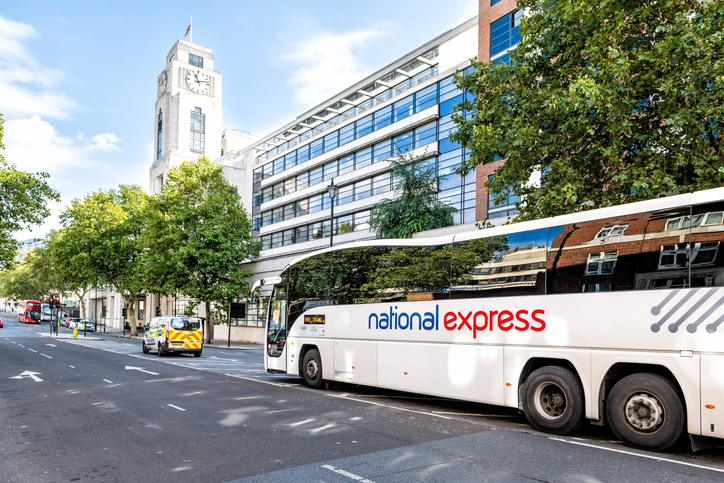ii view: National Express drives into the red
2020 was tough but vaccine rollouts are ongoing and climate change initiatives beckon. Buy, sell or hold?
18th March 2021 17:00
by Keith Bowman from interactive investor
2020 was tough but vaccine rollouts are ongoing and climate change initiatives beckon. Buy, sell or hold?

Full-year results to 31 December 2020
- Revenue down 29% to £1.96 billion
- Adjusted earnings (EBITDA) fell 64% to £187 million
- Reported loss of £327 million, down from a profit of £148 million
- Net debt down 23% to £942 million
- No dividend
Chief executive Ignacio Garat said:
“I am also grateful for the support we have received from both customers and authorities, which demonstrates not only the essential nature of our services but also the strength of the relationships that we have built and the extent to which we are perceived as a trusted partner. This partnership approach, and the non-discretionary nature of the majority of our services positions us well for a strong recovery as travel restrictions are lifted in the months ahead. This is boosted by the sustainable cost savings made, and new contracts won during the period.
“As a business we have an important role to play in modern society and I want us to continue to be at the forefront of the debate on climate change and the role we can play in social mobility. We have a strong and diverse international transport platform that has demonstrated its resilience in recent months. We have a clear set of priorities to ensure we will return to growth in a prudent and safe manner. We will be competing to win"
ii round-up:
UK and international bus, coach and rail operator National Express (LSE:NEX) has reported a loss of £327 million as passenger numbers dived and many of its services were mothballed during the pandemic.
Revenues improved to a fall of 32% year-over-year in the final 2020 quarter to December from a decline of 50% during the initial pandemic in the company's second quarter. But management outlook comments remain cautious given the degree of uncertainty, with no definite time for a return to dividend payments outlined.
National Express shares fell by more than 4% in UK trading, having more than doubled since the end of October, just prior to the announcement of vaccine success. Shares for fellow transport operator FirstGroup (LSE:FGP) are up by a similar amount.
Employing over 50,000 staff, National Express operates services across eight countries including the UK. The US and the provision of both school buses and coaches provide for its biggest market accounting for around two-fifths of total sales - followed by Spain and then the UK.
The chief executive, who only joined in November, has begun a review of group operations. Its remit will include identifying growth in existing countries along with new potential geographies to target. It won £900 million of new contracts across all divisions during 2020 including a first entry into Portugal.
Measures to boost group cash during the pandemic have included an application to the Bank of England’s Covid financing scheme and the sale of new shares to investors via a share placing. Group net debt reduced by £400 million in second half to £942 million.
Accompanying management outlook comments pointed towards continuing momentum into 2021, with slowly improving revenue trends and positive earnings (EBITDA) in January and February. Group liquidity is believed by management to be sufficient to see it through most pessimistic scenarios.
ii view:
National Express operates a fleet of over 31,000 vehicles. Its brands include National Express itself in the UK, ALSA coaches in Spain, yellow school bus provision in both the US and parts of Canada and the Rhine-Münster train express in Germany. Headquartered in Birmingham, its passengers made 938 million journeys on its services during 2019. The German rail business accounts for under 4% of total sales.
Management points to diversification of the company in recent years, which has helped provide resilience during the pandemic. It is also the leading operator in many of its markets. Climate change initiatives including congestion charging schemes and its strength of bus and coach operations offer appeal.
For investors, ongoing pandemic uncertainty and the continued suspension of its dividend payment are clear negatives. Working from home, encouraged during the pandemic, could also dent any future recovery in sales as travel restrictions lift. More favourably, two of its biggest markets, the US and UK, currently have high rates of vaccination rollouts. And the new US president is looking to reduce emissions under climate change concerns. In all, while the shares remain higher risk, the balance of risk reward may now be back in favour of long-term investors.
Positives:
- Potential beneficiary of climate change initiatives
- Diversity of operations
Negatives:
- Ongoing pandemic uncertainty
- Dividend payment suspended
The average rating of stock market analysts:
Buy
These articles are provided for information purposes only. Occasionally, an opinion about whether to buy or sell a specific investment may be provided by third parties. The content is not intended to be a personal recommendation to buy or sell any financial instrument or product, or to adopt any investment strategy as it is not provided based on an assessment of your investing knowledge and experience, your financial situation or your investment objectives. The value of your investments, and the income derived from them, may go down as well as up. You may not get back all the money that you invest. The investments referred to in this article may not be suitable for all investors, and if in doubt, an investor should seek advice from a qualified investment adviser.
Full performance can be found on the company or index summary page on the interactive investor website. Simply click on the company's or index name highlighted in the article.